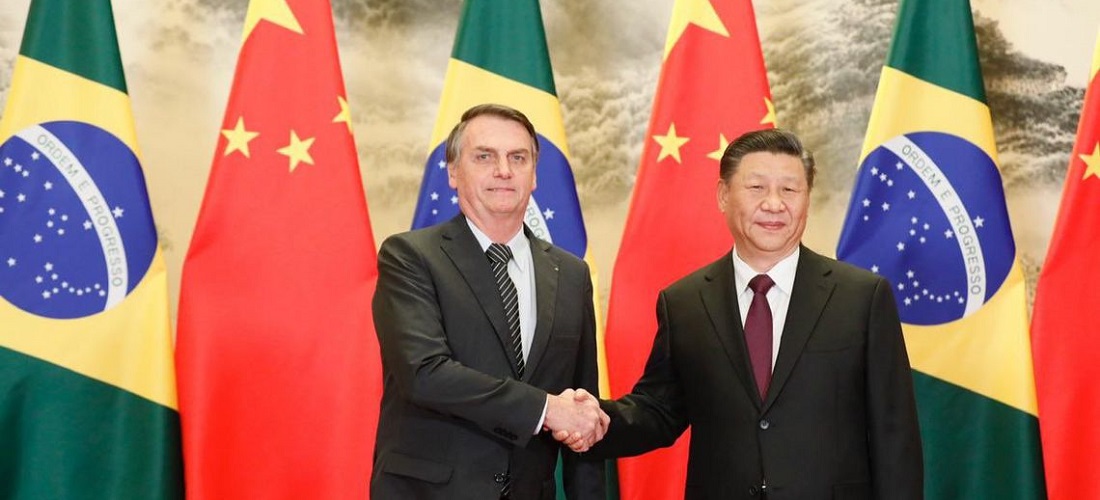
Bolsonaro meets Chinese president to sign agreements
Oct, 25, 2019 Posted by Sylvia SchandertWeek 20144
Today (10/25), Brazil and China signed several agreements and memoranda of understanding in the areas of politics, science and technology and education, economy and trade, energy, and agriculture. President Jair Bolsonaro is in the Asian country, the second of the presidential entourage tour of Asia and the Middle East. He met with Chinese President Xi Jiping at the Great Hall of the People in Beijing.
“I was looking forward to this visit because we have the first trading partner in China and I am very interested in strengthening this trade as well as expanding new horizons. Today we can say that a considerable part of Brazil needs China and China also needs Brazil,” Bolsonaro said during the meeting.
In a joint statement, the two Presidents expressed their determination to expand trade and diversify product exchanges, as well as to cooperate with development and investment policies, such as Brazil’s Investment Partnership Program (PPI) and the Iniciativa do Cinturão and Rota, from China.
China is Brazil’s largest trading partner. In 2018, trade flow between the two countries reached the historical mark of US$98.9bn. The Asian country is also a leading provider of investment in crucial areas such as infrastructure and energy.
Agriculture and trade
Among the signed acts are sanitary protocols for the export of thermo processed meat (which goes through the cooking process) and cottonseed meal from Brazil to China. In 2018, Brazil exported US$557m in processed beef and China imported US$25m of the product. For cottonseed meal, used as animal feed, Brazilian exports are still incipient. China imported US$4m of the commodity last year.
Both countries have also come to recognize Authorized Economic Operator (AEO) certifications issued by the customs authorities of both countries. An AEO-certified company has benefits such as priority handling, fewer inspections, less stringent security requirements, and expedited shipping. The Brazilian authority for this purpose is the Receita Federal. The agreement should ensure greater agility and predictability for AEO-recognized bilateral trade exporters and importers.
The Brazilian Agricultural Research Corporation and the Chinese Academy of Sciences want to establish a Brazil-China “virtual laboratory” that will develop research in the areas of germplasm characterization, genome editing, and functional genetics in soybean. This will be the first joint laboratory project between the two countries in the areas of agriculture and natural resources.
In November, Xi Jinping is due to come to Brazil to attend the 11th BRICS Summit (groups consisting of Brazil, Russia, India, China, and South Africa). Bolsonaro also met today with Chinese Prime Minister Li Keqiang and attended the Floral Affixing Ceremony at the Peoples’ Heroes Monument in Beijing.
On the second day of the official visit to China, the Brazilian president also attended the opening of the Brazil-China Business Seminar: 45 years building bilateral ties. “Brazil has been regaining trust from the world,” he told businessmen.
In addition to the acts with the Chinese government, trade agreements were signed in the area of infrastructure and agriculture, as well as the invitation to participate in China’s oil and gas mega auction, which will take place on November 6. The auction will be for volumes exceeding the Assignment Agreement, which is a regime of direct contracting of Union areas to Petrobras.
Law No. 12,276/2010 granted the state the right to extract up to 5bn barrels of oil equivalent in these non-contracted areas, located in the pre-salt. The result will follow the new sharing law between states and municipalities in Brazil.
Source: Agência Brasil
-
Ports and Terminals
Jun, 08, 2021
0
Santos Brasil sets handling record for a single vessel
-
Other Cargo
Feb, 06, 2023
0
Fertilizer deliveries accumulate 11% decline
-
Ports and Terminals
Jan, 13, 2022
0
Handling rates at Imbituba grow 17.1% in 2021
-
Other Cargo
Mar, 14, 2022
0
USA to invest more than R$ 1 billion in fertilizer production

